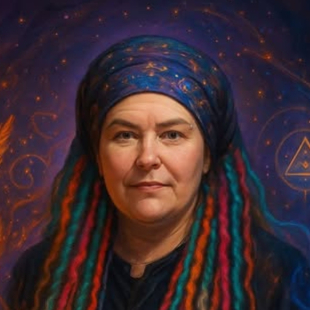Holding Two Truths: The Daily Practice of Living Paradox
- Gin

- Nov 2, 2025
- 3 min read
The Weight of the In-Between
Paradox is exhausting.
Holding two truths at once can feel like being stretched across the edges of your own soul — torn between what’s ending and what’s about to begin.
But paradox isn’t punishment.
It’s the threshold.
It’s the doorway to the horizon — that shimmering space where opposites touch hands and something new is born between them.
Every mystic, every artist, every survivor of transformation learns this:
if you want to live whole, you must learn to live split without shattering.
The Strain of Paradox
Maybe you’ve felt it — that impossible pull between the self you are and the self you sense waiting just beyond the fog.
Between the grief you carry like gravity and the joy that keeps visiting anyway.
Between despair at the state of the world and the ridiculous, holy hope you can’t seem to extinguish.
That tension is real. It hums in the bones.
Most of us want escape from it.
We want one truth to swallow the other — an answer that silences the ache.
But wisdom whispers differently:
the horizon only appears when you can hold both without collapse.

The moment you stop demanding resolution, paradox becomes revelation.
The ache itself becomes evidence of evolution.
Because in that tension, your nervous system is stretching its faith.
The Myth of Either/Or
Fear is an empire built on binary.
It tells you to pick sides: survive or thrive.
Grieve or grow.
Trust or protect.
Nostalgia, the twin tyrant of fear, invites you backward:
Return or be lost.
Shrink or be lonely.
But paradox?
Paradox whispers, both/and.
It tells you that wholeness doesn’t require elimination — it requires integration.
You are not meant to amputate the parts of yourself that disagree.
You are meant to learn their language.
Psychology calls it dialectical thinking.
Mysticism calls it nonduality.
Philosophy calls it synthesis.
But beneath every label is the same sacred pattern:
the dance of contradiction birthing truth.
Light needs shadow to have depth.
Courage needs fear to have meaning.
Faith needs doubt to stay alive.
So when life feels contradictory — that’s not failure.
That’s your evolution showing up unannounced.
The Sacred Skill of Tension
When the heart learns to hold paradox, it becomes an instrument instead of a battlefield.
Your soul becomes a tuning fork for complexity.
This is the secret all healers eventually learn:
the point is not to resolve your dualities — it’s to stay resonant inside them.
To breathe into grief and gratitude at once.
To hold faith and fear like two wings on the same bird.
To be both wound and wonder — and to let that make you wise instead of weary.
Practices for Living Paradox
1. Breathwork
On the inhale, name one truth: “I am hurting.”
On the exhale, name the other: “I am healing.”
Repeat until both feel equally real — because they are.
Let your lungs become the bridge between contradictions.
2. Mirror Ritual
Look yourself in the eyes.
Whisper: “You are both seed and oak. Both question and answer. Both loss and becoming.”
Watch how your reflection changes when you grant yourself that permission.
3. Daily Paradox Journal
Each day, write one line beginning: “Today I hold both…”
Let it be messy. Let it be mundane.
“Today I hold both exhaustion and excitement.”
“Today I hold both doubt and devotion.”
“Today I hold both heartbreak and awe.”
Over time, you’ll see your pages spiral — not in circles of contradiction, but in the sacred geometry of growth.
4. The Paradox Walk (optional)
Walk outside when your thoughts knot.
Let one footstep be sorrow, the next hope.
Step by step, you’ll remember that forward movement doesn’t require resolution — only rhythm.
Why It Matters
The horizon is not an either/or — it’s a spiral.
When we collapse into only fear or only nostalgia, we circle in repetition.
When we hold paradox, we spiral forward into creation.
Paradox is how galaxies expand and how souls mature.
It’s why spring always rises from winter’s bones and why grief always sits next to gratitude at the same table.

To live in paradox is to admit that wholeness is not tidy — it’s truthful.
It’s to let your humanity and your divinity coexist without editing either one.
Because the truth is, you are not meant to be one thing.
You are the conversation between things.
You are the harmony being written between contradictions.
So don’t rush to reconcile what’s still revealing.
Don’t exile parts of yourself that refuse to agree.
Hold them both, gently, like two hands reaching across time.
That tension?
That’s not breaking.
That’s becoming.
And when the ache feels unbearable — remember this:
You are living proof that paradox can be survived.
You are living proof that paradox creates horizons.
🕯️
Kavi Apoha
For the ones learning to be whole in a world addicted to halves.




Comments